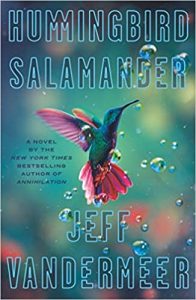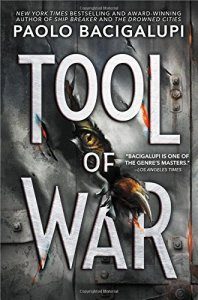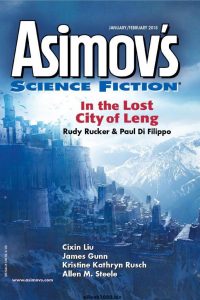Ian Mond Reviews Hummingbird Salamander by Jeff VanderMeer
 Hummingbird Salamander, Jeff VanderMeer (MCD 978-0-374-17354-8, $27.00, 368pp, hc) April 2021.
Hummingbird Salamander, Jeff VanderMeer (MCD 978-0-374-17354-8, $27.00, 368pp, hc) April 2021.
With due regard to Jeff VanderMeer’s earlier work, which I adore, his new novel, Hummingbird Salamander, continues an extraordinary run of books that began with the publication of Annihilation in 2014. Having given us existential horror, modernist science fiction, and portal fantasy, VanderMeer turns the genre dial to the hard-boiled end of the scale with a tale of the Anthropocene told in the language of noir. The opening and closing sentences that bookend the prologue – “Assume I’m dead by the time you read this / “I’m here to show you how the world ends” – provide a taste of the novel’s noir-ish and apocalyptic tone while introducing us to Jane Smith (not her real name). She asks the reader to imagine receiving an envelope, abrupt and unexplained, from the local barista, which holds a key, a scribbled address, and the number seven. “The key is a trap,” she informs us, “but you don’t know that yet.” The address leads Jane to the Imperial Storage Palace, where in a unit marked seven she discovers a taxidermied hummingbird inside a cardboard box (“Frozen wings. Frozen eyes. Iridescent feathers”). Alongside the stuffed bird, there’s a single piece of paper “with two words written on it and a signature. Hummingbird… Salamander – Silvina.” This is all it takes to set Jane on an obsessive, violent, painful quest in search of the Salamander, Silvina, and an answer to the question: why her?
Consistent with her nom de plume, Jane provides false names for the people we encounter, chiefly her husband, daughter, and co-workers, and withholds her exact location, noting it’s somewhere in the Pacific Northwest. Jane is also vague about when her tale is set, though this isn’t a deliberate move; from her perspective, her reader is from the future. This uncertainty, though, allows VanderMeer to do something rather brilliant. Instead of falling back on flashy advanced technology – predictive algorithms, 3D printing, and body enhancements – he employs the growing, encroaching effects of climate change to signify that Hummingbird Salamander takes place, to paraphrase the author, ten seconds from now. That fact, however, isn’t immediately apparent; not because VanderMeer obfuscates (though the species of hummingbird central to the plot – Selastrephes griffin – is fictional) but because, like Jane, we’ve all become so damn good at treating the Anthropocene as background noise. Early references to climate refugees, unprecedented wildfires, snowstorms, and the white rhino’s extinction are easy to gloss over. It’s as Jane dives deeper into the world of eco-terrorism and wildlife trafficking and unearths (literally) Silvina’s journal, within which she speaks to humanity’s reflexive, instinctual, self-destructive compulsion to exploit the planet’s flora and fauna, that Jane begins to appreciate there’s no stopping the impending climate catastrophe, and we, the reader, recognise that Jane’s present is a possible, even inevitable future.
While the existential threat of climate change and especially the rapid extinction of so many species is a major concern of Hummingbird Salamander, what stood out for me is VanderMeer’s portrayal of Jane. Early in the piece, with the help of her assistant Allie, Jane discovers that (a) Silvina is (or was) an eco-terrorist accused of blowing up five people in Argentina, (b) that Silvina’s father is a very wealthy and powerful industrialist who has distanced himself from his daughter’s radical ideology, and (c) that Silvina (apparently) is dead, killed in a hit-and-run accident. As a security consultant, Jane is fully aware of the measures influential people will take to protect their secrets, legacies, and reputations. Regardless, she continues to burrow deeper, covering her tracks by cynically co-opting her co-workers, including Allie, whom she genuinely likes, under the pretence they’re researching a potential client. Even after her frightened husband points out the spy-drone peering into their house, even after one of her colleagues is brutally bashed by assailants unknown, even after someone calling themselves Jack sends her menacing text-messages about the case, and even after the lives of her husband and daughter are threatened, Jane wilfully continues to dig for a trace of Silvina. Key to Jane’s actions and the plot is the gradual reveal of her awful childhood: an abusive grandfather, a distant father, a mentally ill mother, and the one shining light, a supportive brother, who tragically drowns under mysterious circumstances. Jane’s backstory does provide context as to why she is so emotionally stunted and why this quest has become her lodestone; however, it doesn’t come close to excusing the decisions she makes, decisions that directly hurt the innocent and those she loves. And yet, while Jane is not a very likeable person – at times, I loathed her selfish, singular attitude – it’s hard not to be engrossed by her story. Partly it’s because Hummingbird Salamander is a propulsive, hard-boiled novel with several unexpected gear shifts. But mostly it’s because Jane, for all her dissembling about people and places, is never anything but savagely honest about who she is. “I am not a pretty woman,” Jane tells us early in the novel, and while she offers the caveat that she gets her fair share of men chatting her up in bars, there’s a frankness and vulnerability to this admission that makes Jane a fascinating, layered person. The great tragedy of Hummingbird Salamander is that Jane does find the answers she’s looking for, she does have an epiphany about the damage she has wrought, but by then it’s too late. The question that VanderMeer asks is whether it’s also too late for all of us.
This review and more like it in the April 2021 issue of Locus.
 While you are here, please take a moment to support Locus with a one-time or recurring donation. We rely on reader donations to keep the magazine and site going, and would like to keep the site paywall free, but WE NEED YOUR FINANCIAL SUPPORT to continue quality coverage of the science fiction and fantasy field.
While you are here, please take a moment to support Locus with a one-time or recurring donation. We rely on reader donations to keep the magazine and site going, and would like to keep the site paywall free, but WE NEED YOUR FINANCIAL SUPPORT to continue quality coverage of the science fiction and fantasy field.
©Locus Magazine. Copyrighted material may not be republished without permission of LSFF.






An interesting take on the book. I admit I found it painfully boring and Jane impossible to connect to.